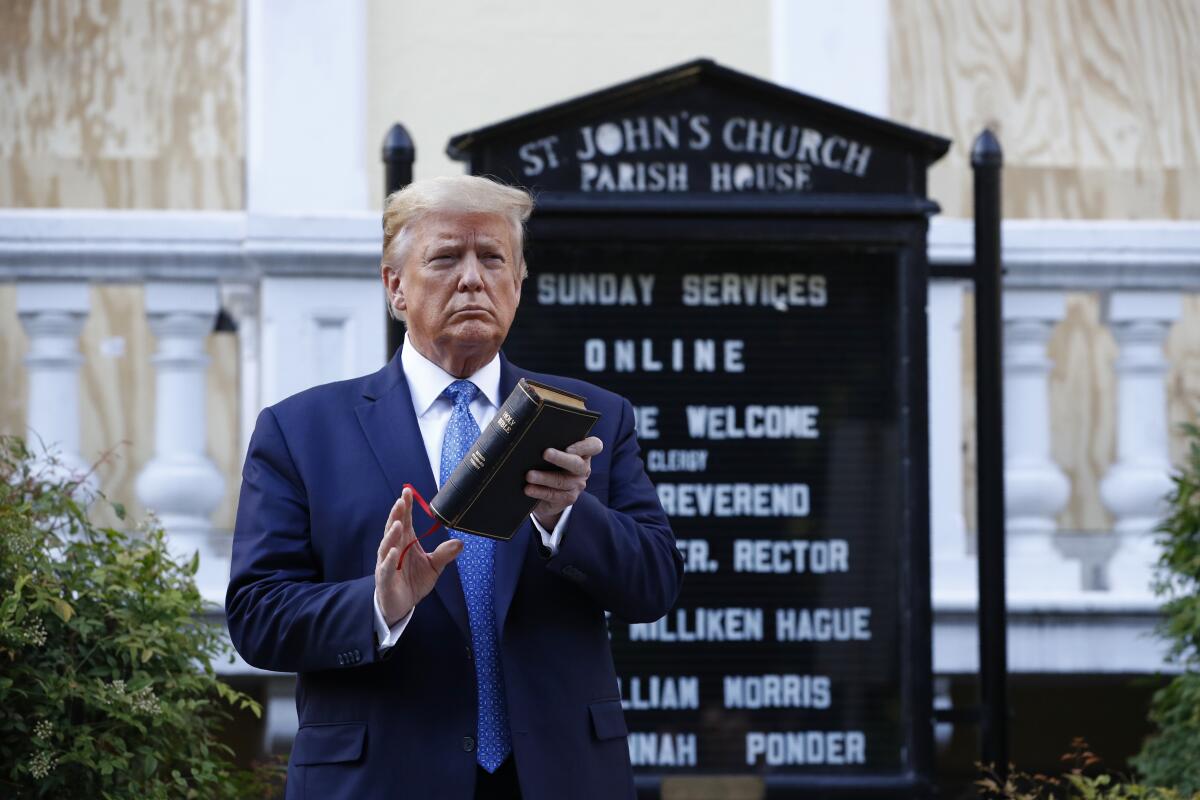Op-Ed: White evangelicals think Trump is divinely ordained. He’ll do almost anything to keep it that way

- Share via
Donald Trump’s reelection chances are quite dim without the robust support of his white evangelical base. His electoral college win in 2016 was fueled by white evangelical turnout and the overwhelming number of white evangelicals — 81% — who pulled the lever for him. He cannot afford for the religious right, made up of white evangelicals along with conservative white mainline Protestants and Catholics, to let up on the rapt support they have shown throughout his presidency.
That helps explain why, in the midst of an unprecedented global pandemic and a historic uprising against racism, the president and his allied power brokers on the religious right are focused not on addressing either crisis, but rather on stagecraft that will reinforce the base’s belief that Trump is a divinely anointed president who is saving white Christian America from ruin.
Trump’s photo op last week in front of the historic St. John’s Church, which looked farcical, sacrilegious and even fascistic to many Americans, was spun — and received — as tough and heroic to his defenders. In the pro-Trump media bubble, America is under siege by leftist terrorists, and Trump is the valorous protector of a “Christian nation.” That the president and his attorney general, William Barr, had protesters tear gassed so Trump could walk to the church was a vibrant symbol of his willingness to fight for the soul of the nation.
“It was strong and powerful for the president to go there and say, we will not be cowed,” Sen. Ted Cruz, the Texas Republican, told Fox News. And Robert Jeffress, a mega-church pastor who is one of Trump’s closest evangelical advisors, told the network the purpose of the president’s visit was “demonstrating his intent to protect churches from those who would try to destroy them.”
Never mind that the leaders of the liberal Episcopal church itself — from the church’s rector to the bishop of the Washington diocese to the presiding bishop of the entire denomination — condemned Trump for hijacking their church for a partisan political ploy.
Once his evangelical supporters had tweeted and broadcast their praises, Trump boasted to his former press secretary Sean Spicer in an interview: “Religious leaders loved it. Religious leaders thought it was great. They loved it.” When Spicer asked him if, during his presidency, he had “grown” in his faith, Trump had no thoughts to offer on his spirituality. Instead, he said, “maybe I have from the standpoint that I’ve seen so much that I can do. I’ve done so much for religion. The Johnson Amendment, getting rid of it. Mexico City. Nobody thought any of this stuff would happen. Two Supreme Court justices.”
If that jumble of words comes off as unbridled narcissism to the average listener, it is crucial to understand how these buzzwords resonate with Trump’s base. The Johnson Amendment is a provision in the U.S. tax code that conditions a house of worship’s tax-exempt status on refraining from endorsing political candidates from the pulpit. Trump did not “get rid of it,” but he did order the Internal Revenue Service to stop enforcing the provision — in the process clearing the way for his clerical supporters to promote his reelection in their sermons. “Mexico City” refers to the global gag rule, imposed by Republican presidents since Ronald Reagan, that bars U.S. nonprofits working overseas from receiving federal funding if they provide abortions, counsel or refer patients for abortions, or advocate for liberalization of abortion laws.
These actions by Trump have enthralled Trump’s evangelical loyalists, many of whom believe he is a divinely anointed president, hand-picked by God to rescue America. But Trump saved the key four words for the end: “Two Supreme Court justices.” The words reminded the religious right that his nomination of Neil Gorsuch and Brett Kavanaugh to the nation’s high court helped them toward their long-held goal of reshaping American jurisprudence. With those four words, he reminded them that he, with the help of the Republican majority in the Senate, potentially installed the votes to overturn Roe vs. Wade, the 1973 decision legalizing abortion, and to expand both statutory and constitutional protections of the religious freedom of conservative Christians.
Trump is reportedly angry that his polling numbers have dipped amid the public health and economic disasters caused by his botched response to the COVID-19 pandemic. That’s one reason Trump insisted that restrictions on large gatherings, intended to stem the spread of the coronavirus, infringed on religious freedom.
It all helps assure evangelicals that Trump, far from being an incompetent leader whose policies helped fuel the deaths of more than 100,000 Americans, is a hero standing up for religious freedom. In the alternative reality of Trump’s religious right defenders, Trump is a victim of a media that lies about him, and of Democrats who “mock prayer” and are “anti-God.”
Now, with the protests triggered by centuries of American racism and, more immediately, by the police killing of George Floyd, Trump is seizing the opportunity to play on decades-old tropes about civil rights protesters being un-American outsiders. But for his base, Trump’s vicious reaction to the protesters is further evidence of his strength standing against America’s supposed enemies and, more crucially, his loyalty to his white Christian supporters.
Sarah Posner is a reporting fellow at Type Investigations. Her new book is “Unholy: Why White Evangelicals Worship at the Altar of Donald Trump.”
More to Read
A cure for the common opinion
Get thought-provoking perspectives with our weekly newsletter.
You may occasionally receive promotional content from the Los Angeles Times.









